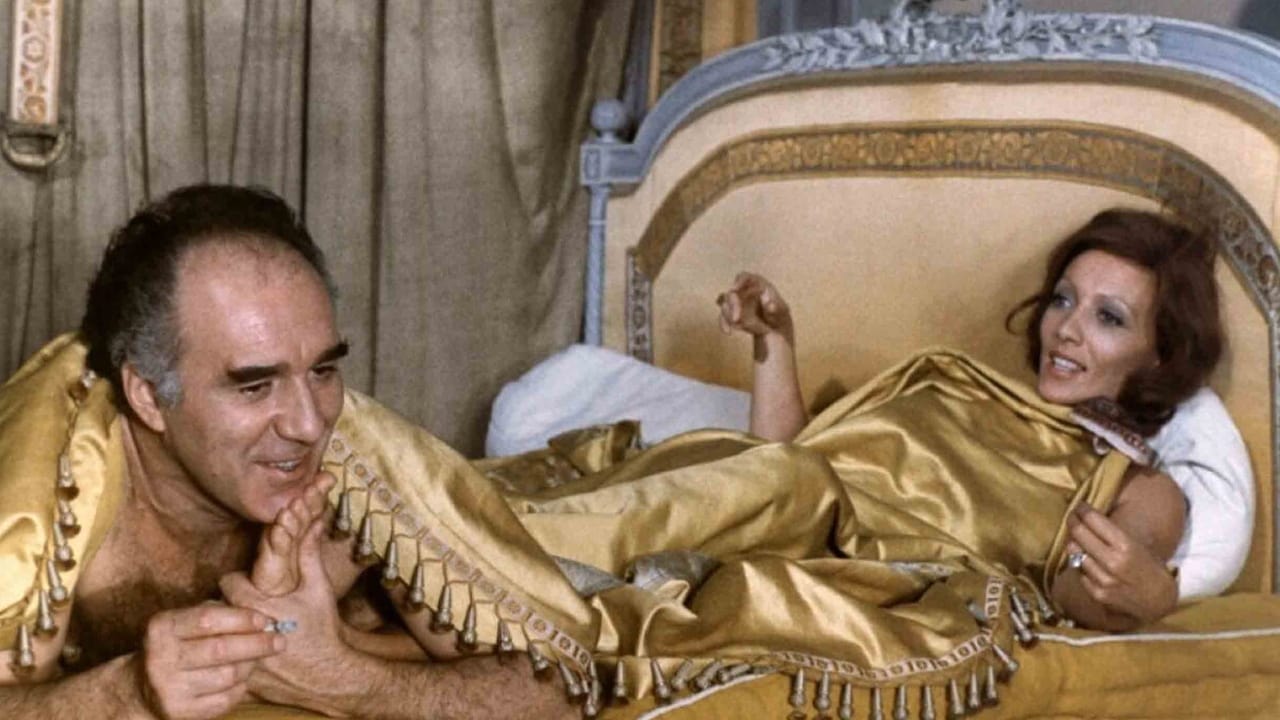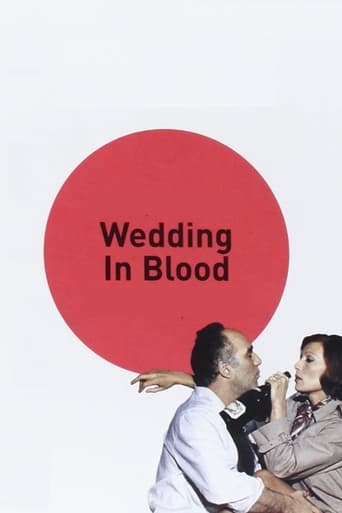lombano
This film has a persistently artificial feel to it that at times serves it well and at times is a hindrance - it sometimes serves to highlight the hypocrisy and corruption of the milieu and give the central characters a decadent air, but at times it interferes with character development, as it interferes with our understanding of the characters. The plot itself is rather conventional but is essentially an excuse to dissect a certain milieu. The most interesting character is in my opinion very underrated: the mayor's stepdaughter, who is clearly intelligent, somewhat sombre but decidedly not bookish. She is the sole character that does not seem motivated by purely selfish, fairly conventional motives (money, political ambition, boredom, sexual desire, etc), making her motivations harder to fathom. She is the only character with any real mystery about her; it's hinted she has some kind of fascination with death, and she makes a surprising comment related to the role of women, all of which add to her ambiguity as a character.
gridoon2018
It's easy to see that "Wedding In Blood" is the work of a cinematic master right from the opening sequence: the camera follows Michel Piccoli as he, after a brief talk with his wife, gets out of his apartment and drives to an idyllic country spot, where he meets Stéphane Audran for some passionate sex. Then, Piccoli becomes just a shadow while the camera follows Audran this time, as she drives back to her own house where her husband and daughter await her. It's a simple technique which, however, perfectly sets up the rest of the story. The problem with the story is that it doesn't really have much psychological depth: the two lovers behave increasingly recklessly, are driven to murder rather inexplicably (since their spouses, for all their faults, hardly pose much of an obstacle to their affair), and get caught (as some DVD covers stupidly spoil!) without offering much resistance. Even the husband's sudden discovery of the truth doesn't ring, well, true - at least the daughter is shown forming her suspicions from early on. Speaking of the daughter, it's a shame that Eliana De Santis, who plays her, seems to have retired from films since the mid-1970s - she is quite an engaging actress, and you can tell that about 5 years later, she would become a total knockout as well. Anyway, "Wedding In Blood" probably doesn't rank among Claude Chabrol's most important films, but it's still gorgeous to look at and interesting to watch, with fine performances all around: Audran and Piccoli's body language totally makes you believe that their characters are crazy for each other. **1/2 out of 4.
christopher-underwood
By no means one of Chabrol's finest this is nevertheless most watchable and the most agreeable and sinister soundtrack always suggests this may become something much grander. As it is it is a fairly predictable tale with the odd twist but leaves the two leads/lovers ending up looking rather stupid. I'm sure Mr Chabrol, like his mentor, Hitchcock found himself a little less than at ease with the ladies. Hence his wife Stephane Audran and Michel Piccoli, two great actors, but who it has to be said, are both so seemingly lacking in passion, are asked to convince that they would gladly rush to a riverbank or rooms within a stately home to make wild, passionate love. I don't think so! Claude Pieplu is great fun as the at first pompous and later calculating cuckold husband and although we are assured he is not 'up to the job' he seems to have far more fire in him than the other two. Certainly worth watching this is a curious example of the director's work and just goes to show that, again like Hitchcock, even his lesser films are at least interesting, if a little awkward.
alice liddell
The films of Claude Chabrol are probably most famous for their artifice, their heightened use of colour, stylised plots and action, elaborate, distancing camerawork, intrusive decor and music, especially their turning domestic melodrama into murder mysteries. But Chabrol first made his name with LE BEAU SERGE, a scrupulously naturalistic rural drama, and mined this vein throughout his career, co-existing in compelling tension with the artifice.LES NOCES ROUGES is on one level Chabrol's most accessible film, with a straightforward plot and realistic filming. The thriller elements are for the most part sublimated, and instead we have a moving tale of adultery and political skullduggery in provincial France. Michel Piccoli is Pierre Maury, deputy vice-mayor, whose wife is permenantly incapacitated by asthma. In the extraordinary opening sequence, his unreciprocated loving gesture to his wife seems like a strangling; as she mopes off to bed, he, in real time, walks through the street, to his car, drives into the forest and there meets a beautiful red-head, Lucienne Delamare, wife of the mayor. They make love on the river bank.It is here the film becomes formally interesting, and questions its very picturesque realism. Like a relay-race, we follow Lucienne now, driving in her car home. There is an edit in her journey though, and because the symmetry doesn't add up, we ask what's missing. When she arrives home it's night, making us wonder how far she lives from the forest, or what she's been doing in the meantime.After dinner with her husband and daughter by another man, she goes to bed, and thinks/dreams about how she and Paul met, how he became a political partner of her husband, how they made love anywhere and everywhere like teenagers on heat - this is the slyly funny film's most comic section, as they sneak into the local chateau, or are nearly caught fornicating behind a bush.The thing is, Lucienne's going into dream/thought mode is signalled by a conventional fading, and by the outside noises of a local celebration. Not only does she visualise things she cannot know - Paul's glum dinner with his wife, for example - but the sequence breaks off not with her, but Pierre, when the image fades 'back', and the outside noise intrudes. What's going on here? How do we reconcile these formal breaches within the film's surface realism?Is it enough to suggest that the film's 'narrative' is actually the projection of Lucienne's desires? Why does Paul come out of Lucienne's dream? Chabrol was one of the first to take Hitchcock's artistry seriously - do the REAR WINDOW-like similarity of initials link Paul and Pierre closer than they seem?This seeming fantasy serves at least two purposes. Firstly it shows that a bond that transcends social rules and probable social ostracism is not all that real - the scene in the chateau, beginning in excitable joy, role play and daring, ending in alienation and disillusion, hinted as much. Alternatively, this realm of fantasy, escape, transcendence, can be seen as a riposte to the very real world of corrupt politics and paralysing marriages. What seemed a rather old-hat investigation into bourgeois transgression becomes something far richer, a psychological dramatisation of a woman's desires.But Chabrol is an ironist, and he would never go too far with any one character. We might regard, for example, the husband and daughter as marginal figures in the main love story if they weren't called Paul and Helene, and therefore linked to Chabrol's other 70s films of love triangles featuring these characters. We expect some kind of intrusion from these, and we do, powerfully so. Indeed, Helen's effacing observing becomes almost supernatural as it comes to wreak passive havoc, as do her constant paralleling with paintings. The Hitchcockian use of a church (and the VERTIGOesque music) also suggest a spiritual dimension seemingly minimal, but possibly devastating.Whatever. This is a Chabrol masterpiece. His recreation of provincial France is beautiful, but always corresponds to emotional states. The acting is extraordinary. Piccoli is one of the great actors, and his burly-eyed charm, decency and humour suggest a man ready to murder, whose embraces are like frenzied maulings, whose civility is undermined by his slurping of soup.Claude Pieplu as the husband is a wonderful comic character who initially suggests a repellent but laughable Charles Bovary (who was once called a monster because he snored on his wedding night), and becomes something much more dangerous. The representation of politics in the film got it banned, and it does reveal corruption in very high places, but Chabrol seems more interested in its dehumanising processes contrasted with the redemption of imaginative power. What is most disturbing about Paul is that we think it perfectly reasonable he be killed.Stephane Audran, Chabrol's wife, is a revelation, though. Normally icily elegant, she is enrapturing here as a woman in love, unafraid to be vulgarly happy, the sense of freedom allowing her to - horrors - smile, laugh, even lounge on chairs.

